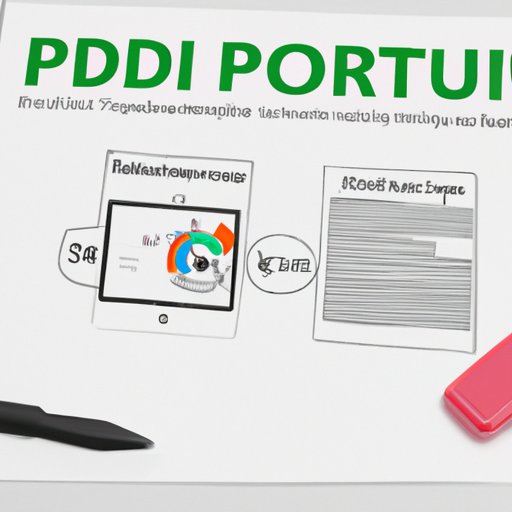
I. Introduction
Drawing on a PDF may seem daunting, but it is an essential skill for professionals who work with digital documents. Whether you are adding diagrams, illustrations, or just some doodles, knowing how to draw on a PDF can save time and make the document more engaging. In this article, we will provide a comprehensive guide on drawing on PDFs, suitable for beginners.
II. 5 Easy Steps to Annotate Your PDF with Drawings like a Pro
Annotation tools enable you to add comments, highlight, and even draw on your PDFs quickly. Here are five easy steps to follow:
Step 1: Open your PDF with your preferred PDF reader, such as Adobe Reader or Foxit Reader.
Step 2: Click on the “Comment” tab and select the “Draw” tool. Choose your preferred tool from the toolbar menu.
Step 3: Click and drag your mouse to draw or use the “Pencil” tool to draw freehand.
Step 4: Use the “Eraser” tool to remove unwanted annotations or the “Undo” function if you make any mistakes.
Step 5: Save your annotations and share your PDF with your team or clients.
Best practices for using annotation tools on PDFs include using different colors and line weights for better readability and using a stylus if you have one, for more precise movements.
III. A Comprehensive Overview of Drawing on PDF Using Adobe Acrobat Pro
If you have Adobe Acrobat Pro, you can use the built-in editing tools to create more sophisticated drawings. Here is a step-by-step guide:
Step 1: Open your PDF in Adobe Acrobat Pro.
Step 2: Click on the “Tools” tab and select the “Comment” option. Choose your desired drawing tool from the toolbar.
Step 3: Click and drag your mouse to draw or use the “Pencil” tool to draw freehand.
Step 4: To customize your annotations, choose the “Properties” option from the “Comment” tab. You can change the color and line weight, and even add pop-up notes or links.
Step 5: Finally, save your annotated PDF by selecting “Save As” and choosing the appropriate file type.
Using Adobe Acrobat Pro has many advantages, including the ability to integrate multimedia elements, such as video or audio, and export annotations as a summary report.
IV. How to Create Interactive PDFs with Drawing Tools and Multimedia Elements
Interactive PDFs are an excellent way to engage with your audience and provide more information than just static text. Here are some advanced tips for creating interactive PDFs:
Step 1: Use Adobe InDesign or other software to design your layout and add text and images.
Step 2: Use Adobe Acrobat Pro to add interactive elements such as forms, hyperlinks, or multimedia elements such as video or audio.
Step 3: Use the drawing tools to add additional elements, such as diagrams or illustrations.
Step 4: Customize your layout and design. You can add custom backgrounds, headers, and footers to give your PDF a more polished look.
Interactive PDFs are a great way to increase engagement with your audience and provide more information than just static text. However, be aware that some PDF viewers may not support all interactive elements and plan accordingly.
V. Drawing on PDF for Business: How to Use Annotations for Collaboration and Communication
Annotations can be a very useful tool in a business environment, especially for feedback, approvals, and collaboration workflows. Here are some use cases for drawing on PDFs in a business setting:
Use Case 1: Sales and Marketing. Sales reps can use PDFs for product demos or presentations. Marketers can use PDFs to create interactive forms or collateral.
Use Case 2: Human Resources. HR teams can use PDFs for recruiting, onboarding, and open enrollment. Employees can use draw tools to fill out forms and highlight important information.
Use Case 3: Legal. Lawyers can use annotations to add comments or highlight important clauses in contracts or legal documents.
Annotations create a more efficient and collaborative workflow and can save significant time in the review and approval process. When collaborating with others on a PDF, make sure that everyone is using the same annotation tool to avoid compatibility issues.
VI. The Art of PDF Drawing: Tips and Tricks to Get Creative in Digital Document Editing
Drawing on PDFs can be a creative process where you can create digital artwork or sketches. Here are some tips and tricks to get creative:
Tip 1: Use layers to separate different elements, such as the background, text, and drawings.
Tip 2: Experiment with different drawing tools, such as the brush, pencil, or shape tools.
Tip 3: Use color effectively. Try using different color palettes for different themes or sections of your PDF.
Tip 4: Use online resources such as forums or tutorials to get inspiration and share your work with other digital artists.
VII. Conclusion
Drawing on PDFs can significantly enhance the functionality and appeal of digital documents, whether for business or personal use. In this comprehensive guide, we have explored different ways to draw on a PDF, including using annotation tools, Adobe Acrobat Pro, creating interactive PDFs, and collaboration workflows. We have also provided tips and tricks to get creative in digital document editing. We urge our readers to practice and experiment with different techniques and tools to unleash their creativity.




